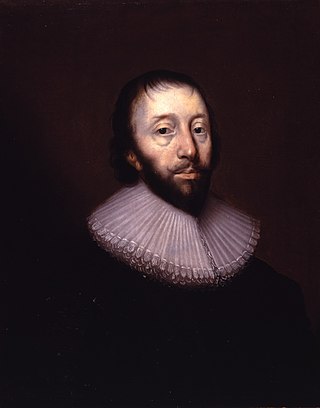Related Research Articles

James Ley, 1st Earl of Marlborough was an English judge and politician who sat in the House of Commons at various times between 1597 and 1622. He was Lord Chief Justice of the King's Bench in Ireland and then in England, and was Lord High Treasurer from 1624 to 1628. On 31 December 1624, James I created him Baron Ley, of Ley in the County of Devon, and on 5 February 1626, Charles I created him Earl of Marlborough. Both titles became extinct upon the death of the 4th Earl of Marlborough in 1679.

Sir Dudley Digges was an English diplomat and politician who sat in the House of Commons between 1610 and 1629. Digges was also a "Virginia adventurer," an investor who ventured his capital in the Virginia Company of London; his son Edward Digges would go on to be Governor of Virginia. Dudley Digges was responsible for the rebuilding of Chilham Castle, completed in around 1616.

Sir Edward Barrett, 1st Lord Barrett of Newburgh,, Bt, was an English politician.

Sir Thomas Richardson of Honingham in Norfolk, was an English judge and politician who sat in the House of Commons from 1621 to 1622. He was Speaker of the House of Commons for this parliament. He was later Chief Justice of the Common Pleas and Chief Justice of the King's Bench.
Sir William Armine, 1st Baronet was an English politician who sat in the House of Commons at various times between 1621 and 1651. He supported the Parliamentary cause in the English Civil War.
Thomas Wentworth was an English lawyer and politician who sat in the House of Commons between 1604 and 1626. He was a vocal if imprudent defender of the rights of the House of Commons.
Henry Pelham was an English lawyer and politician who sat in the House of Commons between 1621 and 1648. He was Speaker of the English House of Commons for a short time in 1647.

Sir John Glanville the younger, was an English politician who sat in the House of Commons at various times between 1614 and 1644. He was Speaker of the English House of Commons during the Short Parliament. He supported the Royalist cause in the English Civil War.

Sir Heneage Finch was an English nobleman, lawyer, Member of Parliament, and politician who sat in the House of Commons at various times between 1607 and 1626. He was Speaker of the English House of Commons in 1626.
Sir Thomas Hatton, 1st Baronet was an English politician who sat in the House of Commons of England variously between 1621 and 1640.
Sir Beauchamp St John was an English politician who sat in the House of Commons variously between 1621 and 1653. He supported the Parliamentary side in the English Civil War.
Sir Thomas Grantham was an English politician who sat in the House of Commons from 1604 to 1629.
John Griffith was a Welsh politician who sat in the House of Commons at various times between 1621 and 1642.
Sir William Uvedale was an English politician who sat in the House of Commons at various times between 1614 and 1645. He supported the Royalist cause in the Civil War.
Sir George Fane was an English politician who sat in the House of Commons at various times between 1601 and 1640.
Thomas Fairfax, 1st Viscount Fairfax of Emley JP was an English landowner and politician who sat in the House of Commons at various times between 1601 and 1626. He was created Viscount Fairfax in the Peerage of Ireland in 1629. He "erected a mansion on Bishophill (York) early in Elizabeth's reign".
Sir Richard Spencer was an English nobleman, gentleman, knight, and politician who sat in the House of Commons from 1621 to 1629 and in 1661. He supported the Royalist cause in the English Civil War.
Richard Taylor was an English politician who sat in the House of Commons from 1661 to 1667. He supported the Royalist cause in the English Civil War.
Sir William Beecher (1580–1651) was an English diplomat, soldier and politician who sat in the House of Commons at various times between 1614 and 1629.
Edward Popham (1581–1641) was an English Member of Parliament for Bridgewater in 1621, 1624, 1625 and 1626, and was also Sheriff of Somerset for the year 1622/23.
References
- 1 2 3 4 5 "Taylor, Richard (TLR596R2)". A Cambridge Alumni Database. University of Cambridge.
- 1 2 3 4 History of Parliament Online
- 1 2 Willis, Browne (1750). Notitia Parliamentaria, Part II: A Series or Lists of the Representatives in the several Parliaments held from the Reformation 1541, to the Restoration 1660 ... London. pp. 229–239.
- 1 2 'Parishes: Clapham', A History of the County of Bedford: Volume 3 (1912), pp. 128-132. Date accessed: 16 June 2012